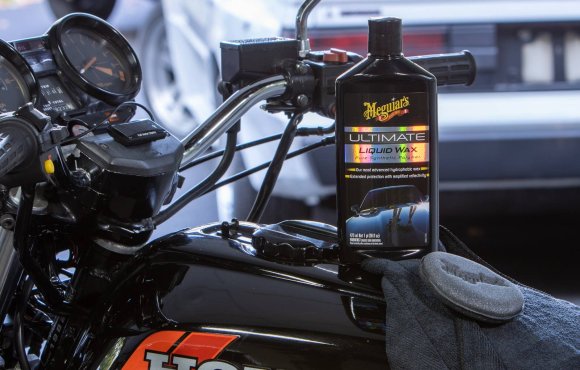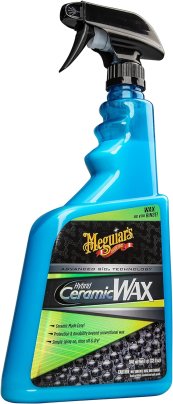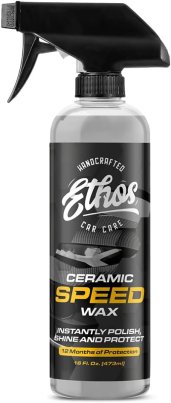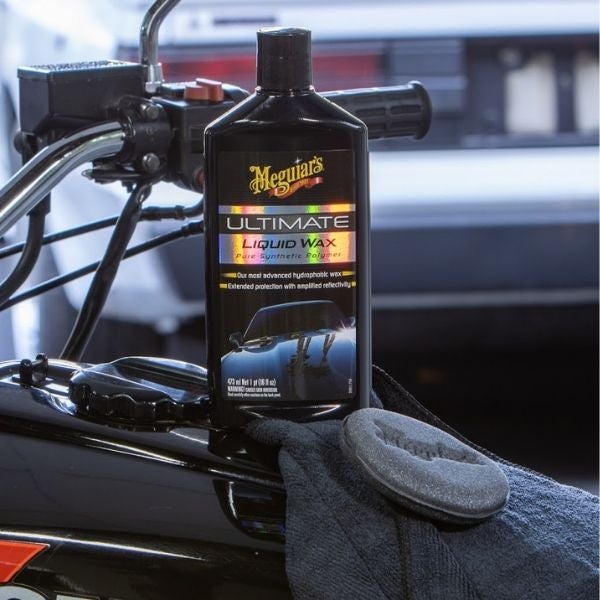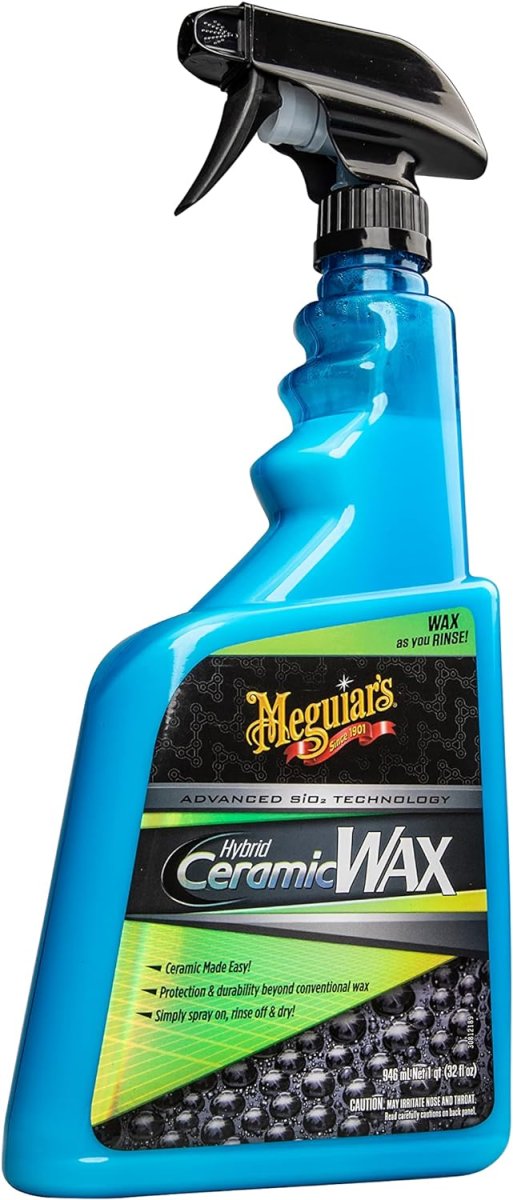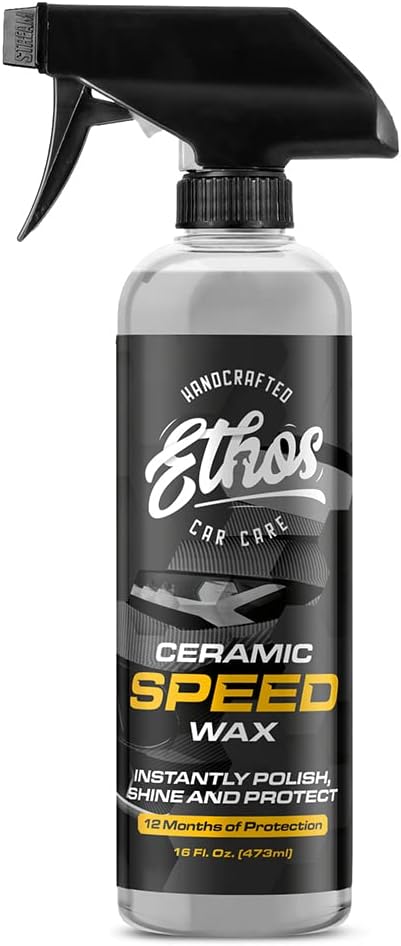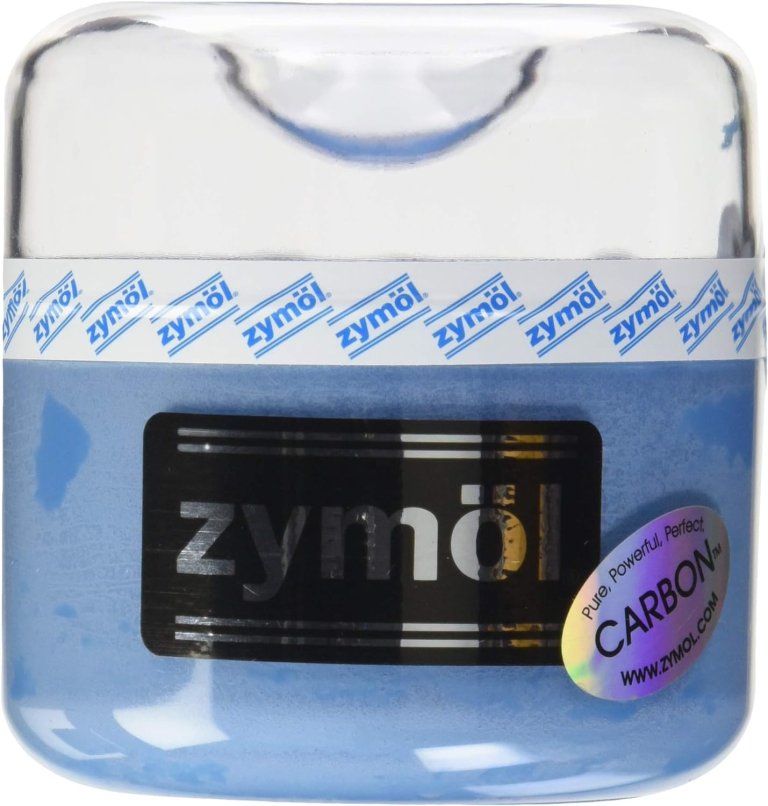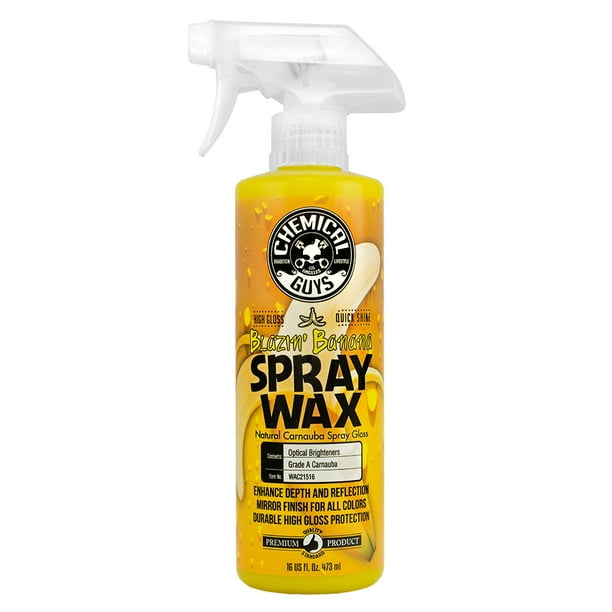We may earn revenue from the products available on this page and participate in affiliate programs. Learn more ›
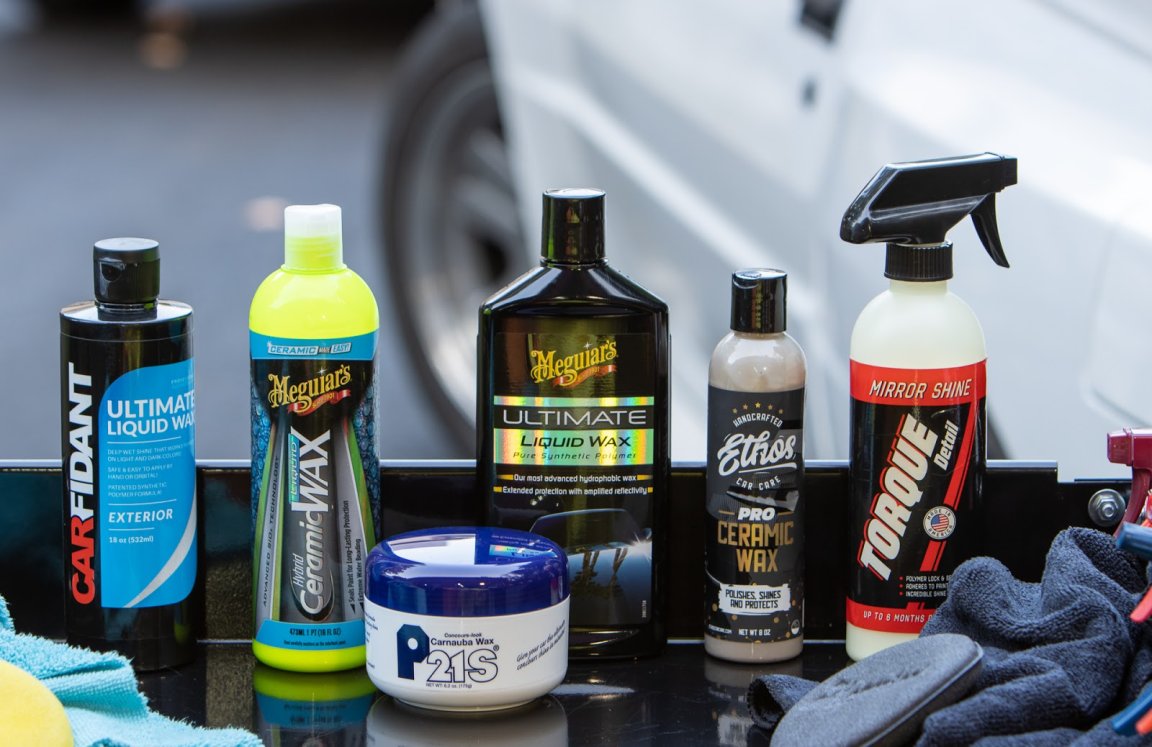
Applying car wax is the finishing touch of a car wash or extensive detail. Regular waxing keeps your car looking good and protects your investment. A coat of wax is the first and last line of defense against paint damage that can reduce your car’s value. Learning how to wax a car begins with figuring out which type of wax to use, and that’s where this comprehensive guide comes in. We’re here to layout everything you need to know about car wax, as well as walk you through some of our favorite waxes currently on the market.
Summary List
- Best Overall: Meguiar’s Ultimate Liquid Wax
- Best Value: Meguiar’s Hybrid Ceramic Wax
- Honorable Mention: Ethos Pro Ceramic
- Best for Black Cars: Zymol Carbon Wax
- Best Scent: Chemical Guys Blazin’ Banana Carnauba Spray Wax
Our Methodology
This is one of those times when we got to do some hands-on testing of the product mentioned below. However, time has gone by since the original tests, and some products have been swapped out for others. That said, plenty of research went into this selection to ensure everything on the list is worthy of your consideration.
Best Best Car Waxes Reviews & Recommendations
Best Overall: Meguiar’s Ultimate Liquid Wax
Pros
- Forgiving enough for beginners
- Straightforward application and removal
- Long-lasting shine and protection
- Polymer formula will not stain trim and can be applied in direct sunlight
Cons
- Some traditionalists consider modern synthetic polymer wax blends to be sealants rather than true car waxes
- Slightly more expensive than other liquid synthetic polymer waxes
Meguiar’s has been in the car care business for a century, and Ultimate Liquid Wax lives up to its name with a combination of value, ease of use, and results like the paint on this nearly 40-year old motorcycle tank. The liquid car wax is formulated to be easy enough for beginners, and it delivers shine and protection that will satisfy long time car care aficionados.
The liquid wax was easy to apply and remove. A thin coat dried to a haze in five minutes and came off with about five seconds of hand buffing. The synthetic polymer blend can be applied in direct sunlight and won’t leave residue behind on non-painted trim pieces. Shine and protection are comparable to traditional carnauba car wax and can hold up longer between applications.
Some car care purists don’t consider synthetic polymer blends real car waxes even if the deep shine and durability are superior. Polymer bonding car wax technology might not be on the cutting edge as ceramic formulations enter the market. Still, Meguiar’s Ultimate Liquid Wax is a versatile performer and worthy addition to any car care kit.
Best Value: Meguiar’s Hybrid Ceramic Wax
Pros
- Spray bottle simplifies application
- High durability
- Quick dry time
- Polymer formula will not stain trim and can be applied in direct sunlight
Cons
- Difficult in comparison to other spray waxes
- Commonly damaged in shipping
Meguiar’s Hybrid Ceramic promises cutting-edge ceramic protection in a product that’s as easy to use as traditional liquid car waxes. Ceramic coatings offer a durability advantage over synthetic polymer or carnauba car waxes. Silicon dioxide, or silica, acts as a glass-like sealant layer to protect the finish and repel water.
Meguiar’s Hybrid Ceramic smelled faintly of blueberries and was simple to apply and remove after just five minutes of drying time. Shine and protection were on par with the synthetic polymer and carnauba competition. Even with its relatively quick drying time, the liquid formula was easy to use and won’t leave residue behind on plastic or unpainted trim.The biggest drawback to this wax is that it can be difficult to learn in comparison to other spray coatings. It’s also common for bottles to arrive damaged from shipping.
Honorable Mention: Ethos Pro Ceramic
Pros
- Multiple layers of protection
- Long lasting coat
- Simple application
Cons
- Difficult to remove
- Streaks easily
Ethos Pro Ceramic wax promises 3-in-1 performance as a wax, polish, and sealant in one bottle. The liquid blend of proven synthetic polymers and the latest ceramic coating technology was designed to provide shine and protection for up to an entire year from a single application. No water or special tools are required.
The liquid appeared thin at first glance but left a thicker layer of material compared to our other test waxes. After the recommended 20 minutes of drying time, the dried-over haze was challenging to remove and left some streaking that required additional effort. Shine and water repellency took a respectable spot in the middle of the car wax pack.
Best for Black Cars: Zymol Carbon Wax
Pros
- Deep shine compliments dark paint
- Treats paint for additional protection
- Easy to apply
Cons
- Expensive
- Doesn’t last as long as other waxes
If you own a vehicle with a dark painted finish, you need a wax that’s specifically designed for the unique needs of this paint. This carbon wax contains 37% carnauba wax for the deepest shine possible. It stands out because it also has several other oils and ingredients to nourish, shine, and protect your vehicle’s paint. This includes banana, coconut, and montan oil. It comes in an eight-ounce jar with an included applicator. You’ll appreciate how easy this wax is to apply with an application and buff process.
One drawback of this wax is that the container it comes in is smaller than other waxes on this list. This can result in it not lasting as long. The formula also doesn’t contain any specific UV protectants. Without them, your dark paint can be vulnerable to fading.
Best Scent: Chemical Guys Blazin’ Banana Carnauba Spray Wax
Pros
- Easy application
- Smells excellent
- Fast curing time makes it great for quick detailing
Cons
- Relatively expensive
- Not as protective as other waxes
This easy-to-apply spray wax uses a refined Brazilian carnauba wax. You’ll find it simple to spray on and wipe off to reveal a deep shine with a wet look finish. What makes this wax stand out is that you can safely use it on paint, glass, clear plastic, metal, and wheels, making it a one-stop shop for detailing your car. The formula cures fast to prevent dust from getting trapped in the wax and dulling the finish. This wax will protect your car’s paint from spots, contamination stains, and UV rays, keeping your paint looking new for longer.
As far as waxes go, this more of a quick detailing tool, and may not be the best choice for the base layer as it doesn’t offer much protection on its own. It’s also a little pricier than many spray waxes that offer a bit more protection.
Our Verdict
Again, Meguiar’s Ultimate Liquid Wax is our top pick, and Meguiar’s Hybrid Ceramic Wax comes in for a close second. Either of these is sure to deliver the protection you’re looking for, and it’s by total coincidence that they come from the same manufacturer. That said, anything else on our list is well worth your consideration if these don’t do it for you.
Car Wax Buying Guide
Types of Car Wax
Natural
The most popular type of wax is natural wax formulas. These waxes tend to be harder and are made from the Copernicia Cerifera palm tree, also known as carnauba. There are two quality grades of carnauba wax: white and yellow. The yellow kind is pure plant wax and is the most expensive option since it achieves a high shine and is very protective. True car enthusiasts and those who own dark-painted vehicles swear by it. The white kind is a slightly lower grade, making it more affordable. There are also carnauba-based synthetic waxes. These are even more affordable but aren’t purely natural wax and won’t achieve the same high-quality results. The downside of any natural wax is that it only lasts a few months before requiring reapplication.
Synthetic
Thanks to modern science, we have synthetic waxes that are artificial formulations. They typically contain chemicals that bond with your car’s paint and can last for up to a year. Some synthetic formulas will also contain cleaning agents, which strip away any contaminants or residues that could prevent bonding. Synthetic waxes are good because they are more affordable than all-natural carnauba wax and are easier to apply. Their downside is that they simply can’t achieve the same results as high-quality natural wax.
Paste
Car wax comes in three types of formulas. The oldest type is a paste, with textures that range from very hard to a soft buttery consistency. Typically, paste wax tends to be formulated from natural waxes, which helps it to achieve a higher shine and deep luster. Unfortunately, it tends to require more frequent applications than liquid or spray formulas. Because it’s typically made from natural wax, it also tends to be more expensive than the other formulas.
Liquid
You’ll like the smoother texture of liquid wax over paste versions. Liquid formulas are typically synthetic or a synthetic and wax formula, which helps them to be longer-lasting. You may also find this style of formula to be harder to apply. Liquid wax tends to dry faster than paste, so you’ll need to work in smaller sections or work faster. You also need to carefully read the labels because some liquid waxes are abrasive.
Spray: Spray waxes are fast and easy to use, making them popular among car owners. This type of wax is suitable for those who want to spot treat areas on their car. You will find many spray formulas have additives for special treatment needs, such as fixing swirl marks, hiding blemishes, or boosting shine. Unfortunately, spray waxes don’t last as long as the other options. However, it’s easy to get a consistent application, and they are usually non-abrasive.
Key Features
Application Method
Think about how much time and effort you want to put into the application of wax on your vehicle. If you enjoy spending time working on and detailing your car, then you’ll want to look for a paste wax made of natural carnauba wax. If you’re looking for a quick and easy solution, then a liquid or spray will be a better option. You’ll also want to check for compatibility with a buffing machine since some waxes require you to apply them by hand.
Longevity
The longer your wax application lasts, the less often you’ll need to apply the wax. Natural waxes don’t last as long as synthetic formulas. However, this may not be an issue if you prefer the finished look of natural wax. Don’t blindly believe the manufacturer’s claims because these are timeframes in the most favorable of conditions. The more extreme your climate and the more often you wash your car will reduce the longevity of your wax application.
Container Size
The larger the container of wax is, the longer it should last. However, this isn’t always true. Some waxes require more product for an even application, which reduces how many applications you can get out of a single container. You should also consider how stable the product is: natural wax formulas could melt and separate in heat, while synthetic formulas may begin to separate in the bottle. You’ll then be stuck buying a new container of wax before you’ve finished the last one.
Car Wax Pricing
There are car waxes that span the gamut of price, but they all top out at under $50. If you’re just learning how to wax a car yourself, don’t spend more than $15. If you’re a professional detailer, well, why are you listening to us? You know how much you should spend. What you need to know is that you won’t break the bank when purchasing a good-quality car wax.
FAQ
You have questions. The Drive has answers.
A. Polishing a car can correct swirl marks, remove oxidation, and smooth out the paint surface. A hand or machine polish prepares the paint for its protective wax coating. Washing and polishing the vehicle before applying wax delivers the best results.
A. This depends on the specific product, the environment where you live, and how frequently you drive. In general, natural waxes do not last as long as synthetic polymer blends or ceramic hybrids that can endure for up to six months or longer in ideal conditions.
A. Not necessarily. Some prefer natural carnauba wax for its deep, warm shine that intensifies with each additional layer. It has some trade-offs, however; it doesn’t tend to last as long as synthetic waxes.
A. Of course. Check with your dealer or manufacturer first, but as long as the new paint is fully cured, you can wax a new car just like any other vehicle. New cars are detailed before delivery, so developing your own car care routine helps keep your new ride looking showroom fresh.
A. Do not use wax specifically formulated or dyed for use on dark-painted vehicles. Choose a wax that’s safe for all paint types. Most car waxes are safe for single- and two-stage base coat and clear coat paint.
A. At least twice a year is the general recommendation but check the wax manufacturer’s recommendations and take the vehicle’s operating environment into account. Harsh environments demand more frequent applications.
